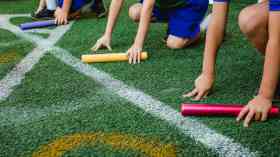Outdoor learning at school and beyond
 Britain has a long tradition of engaging young people in outdoor learning, and the positive impact that this can have on a young person’s development is widely acknowledged. For many years, the term ‘outdoor education’ has been used and is often associated with ‘traditional’ outdoor activities such as rock climbing, canoeing and mountain walking with outcomes generally focussed on personal and social development. Over recent years, however, a growing amount of research has shown that by taking an integrated approach to using the outdoors both in and out of school, much more can be achieved.
Britain has a long tradition of engaging young people in outdoor learning, and the positive impact that this can have on a young person’s development is widely acknowledged. For many years, the term ‘outdoor education’ has been used and is often associated with ‘traditional’ outdoor activities such as rock climbing, canoeing and mountain walking with outcomes generally focussed on personal and social development. Over recent years, however, a growing amount of research has shown that by taking an integrated approach to using the outdoors both in and out of school, much more can be achieved.
Outdoor learning can best be described as an active, experiential approach to teaching and learning, open to all, that involves being outdoors as a central part of the experience. It seeks to use the outdoor environment as a vehicle for transforming the experience into knowledge, skills, attitudes and actions. Outdoor learning helps to develop knowledge of oneself, others, the environment and the curriculum. It provides a means of developing cognitive, affective, and psychomotor skills; encourages empathy, tolerance, understanding, cooperation and collaboration; and fosters positive attitudes towards health, risk, the environment and community.
Benefits
Many teachers have long recognised the value of outdoor learning. Anecdotal evidence has always been strong regarding the benefits of being outdoors, but there is an increasing need to show hard evidence that taking children outside the traditional four walls of the classroom can be justified. The last decade has seen a growing body of research that focuses on both the ‘how’ of outdoor learning as well as the ‘why’ which in turn is laying the foundations for more targeted research into specific outcomes.
The English Outdoor Council has identified key impacts of outdoor learning. Firstly, learning outside the classroom raises educational standards. A 2008 Ofsted report stated that: ‘When planned and implemented well, learning outside the classroom contributed significantly to raising standards’. Authentic experiential learning in the outdoors makes sense of theoretical concepts and provides ways of bringing learning to life. The 2014 primary national curriculum has a strong emphasis on field work skills and there are many opportunities to engage with the outdoors across a range of subjects and topics.
Furthermore, outdoor learning makes a powerful contribution to the broader curriculum and the development of ‘character’. Outdoor learning effectively contributes to the delivery of a broad‑based curriculum which equips young people with valuable life skills and experiences. The Confederation of British Industry (CBI) believes that young people need to be better equipped for the world of work and have identified a range of skills including grit, resilience, self-control, curiosity, confidence and creativity – all of which can be enhanced through outdoor learning.
The English Outdoor Council notes that outdoor activity helps to address health problems and enhances wellbeing. Outdoor activities and learning not only contribute to improved physical outcomes but are recognised as having a significant impact in terms of wellbeing. Research suggests that children need opportunities to be outside and that the outdoors is where many children like to be the most. By allowing children the freedom to be outside, we reinforce their emotional well-being, which in turn enables them to embrace the natural world independently.
The natural environment
Outdoor learning offers for many their first real contact with the natural environment. There is increasing evidence that young people are becoming disconnected with the natural environment. Outdoor learning experiences can re-connect them and engender an awareness of its value and beauty, along the importance of sustaining the planet for future generations. Understanding their own world is the first step to helping understand the wider world.
In addition, out-of-school activities help to reduce disengagement, anti-social behaviour and crime. Outdoor activities have been recognised as a powerful means of engaging young people in more positive activities across all year groups. Forest Schools programmes, for example, have been shown to change the pro-social behaviour of whole year groups in lower KS2 leading to increased engagement and less disruptive behaviour in class. At the same time, Princes Trust programmes have succeeded in reintegrating young people at risk of becoming not in education, employment or training (NEET).
The English Outdoor Council inform that outdoor learning can build cross-cultural understanding and can change communities. Studies have shown that outdoor recreation can contribute to combating discrimination and have benefits on the wider community.
Moreover, outdoor learning helps young people to manage risk and encourages them to welcome challenge. Exposure to outdoor activities contributes towards young people developing a proportionate response to the exposure of risk.
Finally, outdoor learning contributes positively to societal outcomes. In 2012, Social Evaluator undertook an evaluation of the Social Return On Investment (SROI) of residential outdoor learning programmes run by Scottish Outdoor Education Centres (SOEC). The report showed that every £1 invested in this activity brings a social return of £11.02. Evaluation of the National Citizen Service (NCS) programme currently being run for 15-17 year olds in England also shows a positive social return on investment when taking into account education, volunteering, leadership skills and health and wellbeing benefits.
Critically, the EOC believes that while learning outside the classroom has a powerful impact it is far from being an equal opportunity, and for some it is a lost opportunity. A progressive range of learning experiences outside the classroom, including at least one residential experience, should be an expectation for all young people.
Making it happen
A perception of excessive red tape, the threat of litigation and the resources needed to accomplish any sort of teacher-led activity in school time has meant that there has been a move towards the more traditional activities becoming the sole preserve of residential outdoor education centres and specialist providers. Visits to the centres generate valuable experiences, the learning from which can then be transferred back to the school environment. However, by developing the confidence and skills of teaching staff it becomes possible to integrate outdoor learning across all aspects of school life. Starting with the school grounds and then moving further afield means that learning can be transferred between different settings, thus enhancing the possible outcomes.
The school grounds and immediate vicinity provide numerous opportunities for developing numeracy, literacy and field work skills and, with some basic skills in place, it becomes possible to meet specific curriculum outcomes that cut across all aspects of the curriculum. It is sometimes beneficial to utilise specialist help and many centres offer day visits as a means of meeting specific curriculum targets. If the topic being introduced is based around rivers, could that involve a day out following a river from source to sea? Alternatively, canoeing, for example, could be a personal and team development activity. It could be a way of experiencing the forces involved with paddling and buoyancy, the water cycle, fresh water habitats, boat design, local history and geography, maths, creative writing and many more. If you are studying the Vikings, a canoe session could be part of a planned invasion of the far shore followed by the establishment of a settlement and cooking some Viking food over an open fire.
Choosing a specialist provider
The Association of Heads of Outdoor Education Centres (AHOEC) represent the leaders and managers of providers who offer high quality, innovative, outdoor learning experiences to young people across the UK. Membership is widely regarded as a hallmark of ethical and quality management.
A visit to an AHOEC centre can have many different outcomes. It can be an opportunity to develop a range of skills, both interpersonal and activity based, one for personal development – facing new challenges, overcoming fears – or just a chance to experience new things or have a break. The time, space and intensity of the residential experience is key to developing relationships and learning opportunities. Participants can create a new community away from their normal distractions and give them time and space to address their goals within a supportive environment.
The AHOEC promotes its own Gold Standard quality mark for centres which are accredited as being a safe and quality outdoor experience.
Further information
www.ahoec.org
Latest News
27/11/2025 - 11:53
Ofqual has published revised statistics on access arrangements for GCSEs, AS and A levels, alongside new research into the role of time pressure in assessment.
26/11/2025 - 15:22
The announcement follows an earlier pledge of £10 million in funding to provide every primary school in England with a library by 2029.
26/11/2025 - 10:18
The Diets Toolkit recommends that governments introduce more plant-based options in schools, alongside hospitals and other public institutions,
25/11/2025 - 13:05
New data from The Careers & Enterprise Company (CEC) finds that around two-thirds of businesses believe a two-week block of work experience is too time-consuming and offers too little benefit.
25/11/2025 - 12:57
The Youth Sport Trust has launched its latest Class of 2035 Report, warning that unless urgent action is taken to increase physical activity among children, this generation will face poorer health and outcomes.







